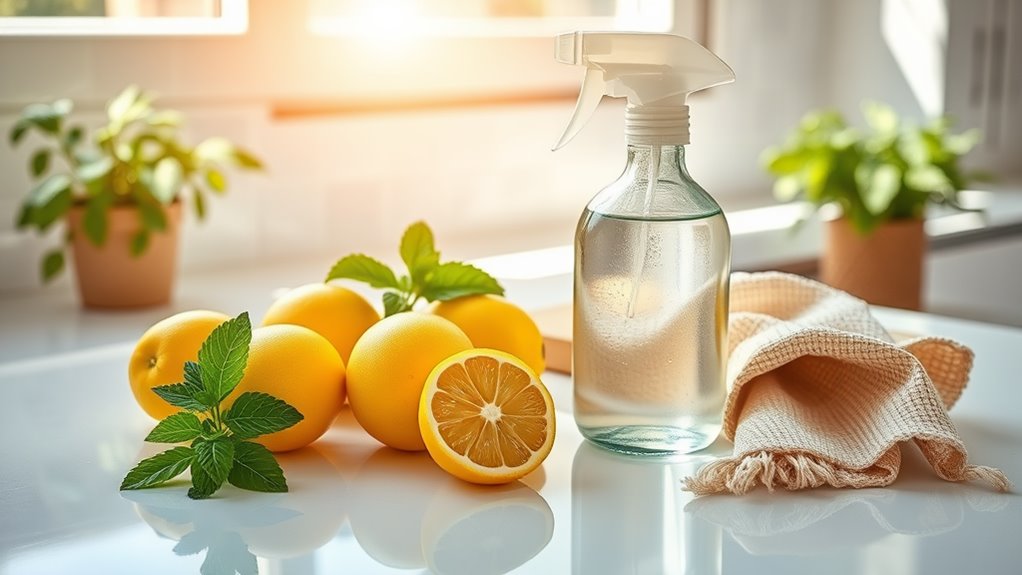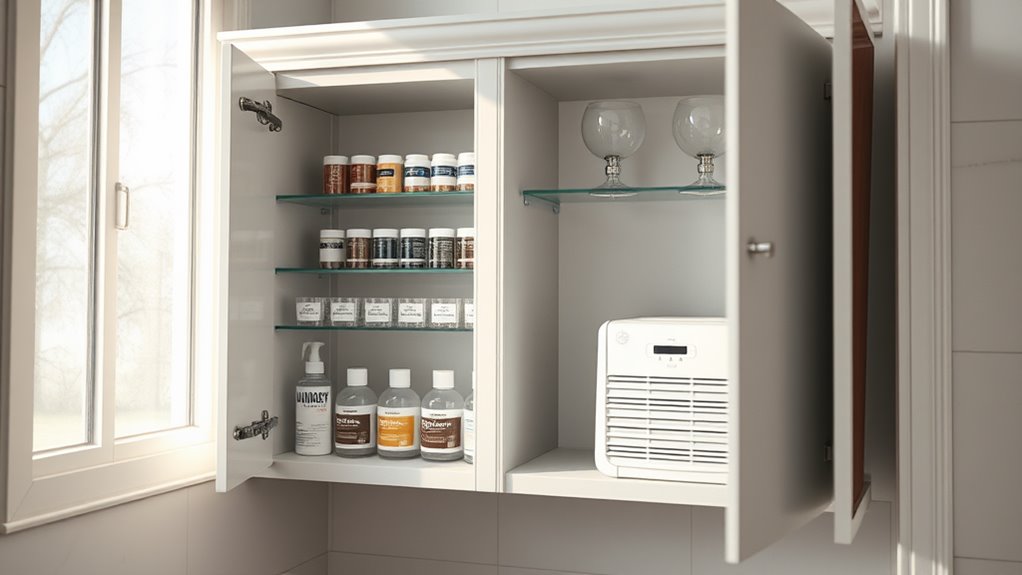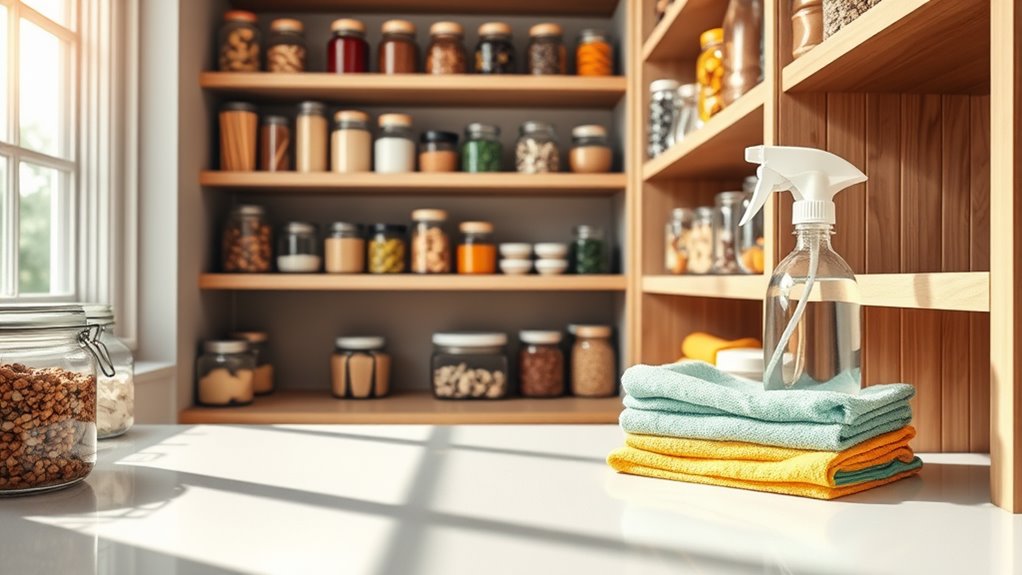Why You Should Stop Using Store-Bought Cleaners on Your Counters
You should stop using store-bought cleaners on your counters because they often contain harmful chemicals that can irritate your skin and respiratory system. These cleaners can damage various countertop materials and leave toxic residues behind. Additionally, they contribute to environmental pollution and incur ongoing costs. By switching to natural alternatives like vinegar and baking soda, you can maintain hygiene without harsh chemicals. Keep exploring practical tips and insights to make the shift easier for you.
Key Takeaways
- Store-bought cleaners often contain harmful chemicals that can irritate skin, disrupt hormones, and trigger allergies.
- Harsh ingredients can damage specific countertop materials, leading to etching or dullness.
- Conventional cleaners contribute to environmental pollution and create unnecessary waste with single-use plastic packaging.
- Homemade alternatives, like vinegar and baking soda, are cost-effective, versatile, and safer for your health and the environment.
- Transitioning to natural cleaning solutions enhances indoor air quality and minimizes health-related expenses.
The Hidden Dangers of Chemical Ingredients
The countertop truth is that these products often include harmful substances like phthalates, parabens, and ammonia. You mightn’t realize that these chemicals can irritate your skin, respiratory system, and even disrupt hormonal balance. Additionally, many conventional cleaners can leave behind toxic residues that may continue to affect your health long after cleaning. When you wipe down your kitchen surface, you’re not just cleaning; you’re exposing yourself to potential toxins. It’s essential to read labels carefully and educate yourself on what’s lurking in those bottles. Using natural alternatives can significantly reduce the presence of harmful chemicals in your kitchen. Instead of relying on these commercial cleaners, consider natural alternatives like vinegar or baking soda, which are effective natural disinfectants that can help maintain a clean and safe environment. Incorporating a DIY cleaning spray into your routine can further enhance your cleaning process, ensuring that you effectively remove grime while utilizing eco-friendly solutions. Mastering your cleaning routine means choosing safer, effective options that protect both your health and your countertops.
Impact on Different Countertop Materials
When you choose a cleaning method, the type of countertop material in your kitchen plays an essential role in determining the best approach.
Using store-bought cleaners can damage certain surfaces, so it’s vital to understand the impact on each material. Here’s a quick guide:
-
Granite: Avoid acidic cleaners; they can etch the surface.
-
Marble: Use pH-neutral solutions to prevent stains and dullness. Additionally, many natural cleaners can be just as effective as store-bought options while being safer for your health.
-
Wood: Opt for natural oils or vinegar; harsh chemicals can warp or crack.
-
Laminate: Stick to mild soap and water; strong cleaners can cause peeling.
-
Stainless Steel: Use dedicated cleaners to avoid scratches and maintain shine.
Additionally, many store-bought cleaners contain harmful chemicals that can compromise both your health and the longevity of your countertops.
Allergies and Respiratory Issues
Many store-bought cleaners contain harsh chemicals that can trigger allergies and respiratory issues, especially for sensitive individuals. By switching to natural alternatives, you can improve your indoor air quality and reduce your risk of adverse reactions. It’s time to reflect on how your cleaning products affect your health and well-being. Additionally, choosing allergy-safe cleaning products can further minimize respiratory reactions and skin sensitivities while maintaining a clean home. Using natural ingredients instead of chemical-laden options not only benefits your health but also contributes to a more sustainable lifestyle. Cleaning with eco-friendly solutions can also help you achieve a fresh environment while avoiding the harmful side effects of conventional cleaners. For instance, incorporating pet-safe natural cleaning solutions into your routine can provide effective cleaning without compromising the health of your furry friends. Opting for DIY cleaning solutions can also save you money while ensuring a safe and healthy environment for everyone in your home.
Chemical Sensitivity Concerns
As you clean your home, consider that the harsh chemicals in store-bought cleaners can trigger allergies and respiratory issues.
Many people experience sensitivities that lead to discomfort, making it vital to choose your cleaning products wisely.
Here are some common symptoms you might encounter:
- Sneezing or nasal congestion
- Skin rashes or irritation
- Shortness of breath
- Coughing or wheezing
- Headaches or migraines
These reactions can make your cleaning routine a source of distress rather than relief.
By opting for natural alternatives, you can create a safer environment while maintaining cleanliness.
Embrace essential oils, vinegar, or baking soda to effectively tackle messes without risking your health.
Your counters deserve a cleaner that respects your well-being.
Indoor Air Quality
Indoor air quality substantially impacts your health, especially regarding allergies and respiratory issues.
When you rely on store-bought cleaners, you’re introducing volatile organic compounds (VOCs) into your environment. These chemicals can trigger asthma, worsen allergies, and compromise your overall respiratory function.
You mightn’t notice immediate effects, but over time, prolonged exposure can lead to serious health problems.
Environmental Consequences of Store-Bought Cleaners
While you may think store-bought cleaners make your home spotless, they often come with hidden environmental consequences.
These products can harm both the planet and your health. By relying on them, you contribute to pollution and waste that can persist for years.
Consider the following impacts:
-
Chemical runoff: Harmful substances enter waterways, affecting aquatic life. Many of these cleaners contain harmful chemicals that disrupt ecosystems, leading to long-term ecological damage.
-
Ozone depletion: Volatile organic compounds (VOCs) contribute to air pollution.
-
Plastic waste: Single-use bottles add to landfill overflow.
-
Resource depletion: Manufacturing requires significant energy and raw materials.
-
Toxic exposure: Harmful residues linger, affecting indoor ecosystems. Additionally, many store-bought cleaners contain harmful substances that can disrupt both human health and the environment, leading to long-lasting effects on indoor air quality. Using eco-friendly alternatives, such as natural ingredients, can significantly reduce these risks.
The Cost of Convenience: A Financial Perspective
When you reach for store-bought cleaners, you mightn’t realize the hidden expenses that come with that convenience.
While they save you time in the short term, consider how making your own cleaners can lead to significant savings over time.
Let’s explore how these choices impact your wallet in the long run.
Hidden Expenses of Convenience
Although store-bought cleaners seem like a convenient solution, they often come with hidden expenses that can add up over time.
You mightn’t realize the financial burden these products impose until you break down the costs involved.
- Frequent purchases for various cleaning tasks
- Packaging waste contributing to environmental fees
- Potential health issues leading to medical expenses
- Ineffective formulas requiring you to buy more products
- Brand loyalty locking you into higher-priced options
Long-Term Savings Potential
Choosing to stop using store-bought cleaners can lead to significant long-term savings that often go unnoticed. When you switch to homemade alternatives, like vinegar or baking soda, you’re investing in cost-effective solutions rather than expensive branded products.
These ingredients aren’t only affordable but also versatile, allowing you to tackle multiple cleaning tasks without constantly restocking your supplies.
Over time, you’ll notice that the initial investment in essential oils or bulk ingredients pays off, as you reduce your cleaning budget.
Plus, by eliminating chemical-laden products, you may save on health-related expenses linked to exposure.
Ultimately, adopting a more sustainable cleaning approach not only benefits your wallet but also fosters a healthier home environment, enhancing your mastery over your living space.
Natural Alternatives for Effective Cleaning
While many people rely on store-bought cleaners for their household chores, natural alternatives can be just as effective—and often safer.
You can easily whip up powerful cleaning solutions using simple ingredients found in your kitchen. Here are some fantastic options to evaluate:
-
Vinegar: Great for cutting grease and disinfecting surfaces.
-
Baking Soda: Acts as a gentle abrasive and deodorizer.
-
Lemon Juice: Natural antibacterial properties and a fresh scent.
-
Castile Soap: A versatile soap made from plant oils, perfect for many surfaces.
-
Essential Oils: Add to your cleaners for both fragrance and antimicrobial effects.
Switching to these natural alternatives not only enhances your cleaning routine but also contributes to a healthier home environment.
Benefits of Homemade Cleaning Solutions
When you make your own cleaning solutions, you not only save money but also gain control over the ingredients you use. This mastery allows you to customize your formulas based on your specific needs. You can choose natural, non-toxic ingredients that are safe for your family and the environment.
Additionally, creating your own cleaners can be a fun and rewarding process; you’ll develop a deeper understanding of how each ingredient works together. Homemade solutions often outperform commercial ones, providing effective cleaning without harsh chemicals.
Plus, you can experiment with scents, ensuring your home smells exactly how you want. Ultimately, making your own cleaners empowers you to create a healthier, more personalized cleaning routine.
Maintaining Hygiene Without Harsh Chemicals
Maintaining a clean and hygienic home doesn’t have to involve harsh chemicals that can compromise your health.
You can effectively disinfect your surfaces using natural alternatives that are just as powerful, if not more so.
Here are some methods to maintain hygiene without the toxins:
-
Vinegar: A natural disinfectant that cuts through grime and odors.
-
Baking Soda: Great for scrubbing and deodorizing surfaces.
-
Lemon Juice: Its acidity helps kill bacteria and leaves a fresh scent.
-
Essential Oils: Oils like tea tree and lavender offer antimicrobial properties.
-
Castile Soap: A versatile soap that’s safe for various cleaning tasks.
Making the Switch: Tips for Transitioning to Natural Cleaners
Changing to natural cleaners can feel overwhelming, but with a few simple steps, you can easily make the switch.
Start by evaluating your current cleaning products; identify those you use most often. Gradually replace them with natural alternatives like vinegar, baking soda, or essential oils. You don’t need to toss everything at once—use up what you have before making the change.
Experiment with DIY recipes tailored to your needs, and don’t hesitate to adjust the ratios until you find what works best. Keep a well-labeled spray bottle handy for easy access.
Finally, embrace the learning curve; mastering natural cleaning techniques takes time, but your health and environment will thank you for it!
Frequently Asked Questions
How Can I Tell if a Cleaner Is Truly Natural?
To determine if a cleaner’s truly natural, check the ingredient list for recognizable components. Look for certifications like USDA Organic, and avoid synthetic fragrances or dyes. Your choices should prioritize safety for both you and the environment.
Are There Any Specific Recipes for Homemade Cleaners?
You can easily make effective homemade cleaners. Combine equal parts vinegar and water for a disinfectant, or mix baking soda with lemon juice for a powerful scrub. Experiment with essential oils for added fragrance and antibacterial properties.
What Tools Do I Need for Natural Cleaning?
To start natural cleaning, you’ll need basic tools: microfiber cloths, spray bottles, a scrub brush, and a mop. Optional items like essential oils and baking soda enhance your cleaning experience and effectiveness, making it enjoyable.
How Often Should I Clean My Countertops With Homemade Solutions?
You should clean your countertops with homemade solutions daily, especially after food prep. Regular cleaning prevents buildup and keeps surfaces sanitary. Tailor your routine based on usage, ensuring a consistently fresh and healthy kitchen environment.
Can Homemade Cleaners Disinfect Effectively Like Store-Bought Ones?
Yes, homemade cleaners can disinfect effectively, especially with ingredients like vinegar and essential oils. You just need to guarantee you’re using the right ratios and letting the solution sit for adequate time to eliminate germs.



